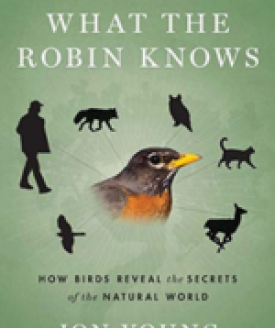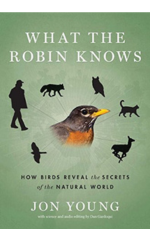
Summer Environmental Book Club: Turning Over a New Leaf A Future Is In Our Hands program
In our final summer book, What the Robin Knows, author Jon Young bridges indigenous knowledge, research and personal experience to better understand the language and behavior of birds as indicators of ecosystem health. This book shares the wisdom of birds as a pathway to deepen our connection with the environment, animals and ourselves.
This book club session will be co-facilitated by the Vermont Fish and Wildlife Department’s Director of Outreach and Education Programs Coordinator, Alison Thomas.
Please register with Barbara Shatara at bshatara@burlingtonvt.gov for meeting info and how to obtain the book.
About the Facilitator:
Alison Thomas has been with the department since 2011. She holds a master's degree in natural resource management, with a concentration in environmental education, from the University of Wisconsin-Stevens Point. Alison oversees the Outreach Division including information and marketing, hunter education and conservation education programs. She works with staff to develop and implement strategic communications initiatives and outreach plans. As education programs coordinator, Alison is responsible for supervising the department's two Green Mountain Conservation Camps (Buck Lake and Kehoe). She is also responsible for managing the Let's Go Fishing program, serving as the statewide coordinator for the Project WILD program, leading the Wildlife Management for Educators course, providing assistance at department outreach events, and helping to develop and support environmental education initiatives within the Agency. During her time off, Alison enjoys running, and doing outdoor activities with her family.

More About the Book:
A lifelong birder, tracker, and naturalist, Jon Young is guided in his work and teaching by three basic premises: the robin, junco, and other songbirds know everything important about their environment, be it backyard or forest; by tuning in to their vocalizations and behavior, we can acquire much of this wisdom for our own pleasure and benefit; and the birds' companion calls and warning alarms are just as important as their songs.
Birds are the sentries—and our key to understanding the world beyond our front door. Unwitting humans create a zone of disturbance that scatters the wildlife. Respectful humans who heed the birds acquire an awareness that radically changes the dynamic. We are welcome in their habitat. The birds don't fly away. The larger animals don't race off. No longer hapless intruders, we now find, see, and engage the deer, the fox, the red-shouldered hawk—even the elusive, whispering wren.
Deep bird language is an ancient discipline, perfected by Native peoples the world over. Finally, science is catching up. This groundbreaking book unites the indigenous knowledge, the latest research, and the author's own experience of four decades in the field to lead us toward a deeper connection to the animals and, in the end, a deeper connection to ourselves.
Thank you to our Sponsor, Mascoma Bank and to our Partner, Vermont Fish & Wildlife Department
.png)
.png)